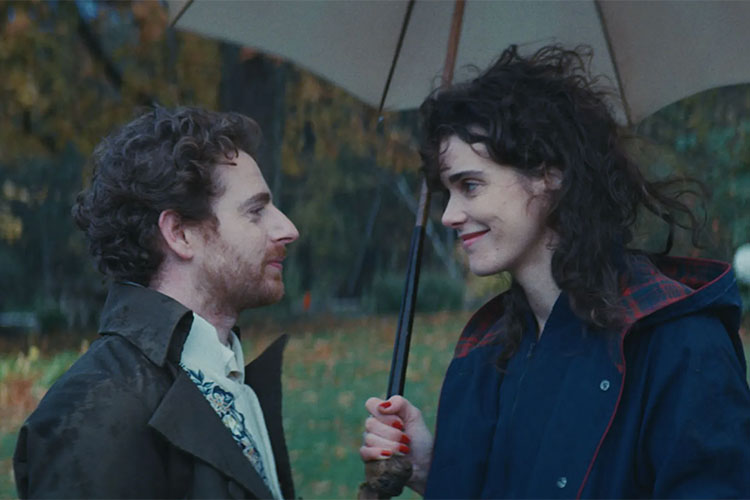The following questions and answers are excerpted from a conversation that followed the NBR screening of Jane Austen Wrecked My Life.
Laura, let’s start with the title. I had to laugh—Jane Austen doesn’t wreck anyone’s life… or does she?
Laura Piani: It all started years ago, when I worked night shifts at Shakespeare and Company in Paris. I was surrounded by aspiring writers, actors, and musicians—we all felt a bit out of place. Literature was our refuge, but it could also trap us. That tension—between inspiration and entrapment—was the seed of this story. Later, I told our producer how much I missed art-house romantic comedies like the ones Richard Curtis made in the ’90s. I wanted to bring that spirit back, but with a personal lens. I was grieving when I started writing, and I wanted to make a comedy that could still hold that emotional weight.
Camille Rutherford: I related to Agathe immediately. She doubts everything—her intelligence, her talent, her worth. That’s a feeling I know well. My sister is a novelist, and watching her write her first book really informed my connection to this role. It took her five years and she doubted herself the entire time. I felt like I had lived this story with her already. And I love that the film demystifies what writing looks like. It’s not glamorous—it’s difficult, lonely, and often full of self-doubt.
Shakespeare and Company was the first piece of the puzzle
Were there particular scenes that were especially hard to pull off?
CR: The ballroom scene was definitely a challenge. We only had one night to film it, and I had never done a period dance scene before. I was nervous—I didn’t know the steps, and it’s more technical than it looks. But Charlie Jansen, who plays Oliver, is a wonderful dancer. He helped me a lot.
The film moves between French and English beautifully. Can you talk about how that multilingual structure came about?
LP: I wanted the film to reflect who I am—a French woman going to England. I didn’t want to copy an English film. I also love when films embrace the texture of real language. If the story works, the audience accepts the shifts. It was a challenge for casting though—we needed actors who could switch languages effortlessly. That gave us more freedom in the edit, too. Sometimes I kept French dialogue, sometimes English. It was very instinctive.
What about the locations? Shakespeare and Company is such a touchstone for you—how did filming there come together?
LP: Shakespeare and Company was the first piece of the puzzle. I’d dreamed of filming there before I even had a script, and they said yes, which was rare—they don’t usually allow shoots anymore. We filmed at night when the shop was closed, which made it feel magical. As for the writers’ retreat in England, I did research and visited Chawton, where Jane Austen lived. But we couldn’t shoot at the real place, so I created my own fictional version. The house we found wasn’t perfect—it had broken stairs and peeling wallpaper—but that’s what I loved about it. It felt lived in. I wanted the retreat to feel sincere, not luxurious.
You’ve mentioned the importance of music in the film—can you talk more about your choices?
LP: Some of the pieces were in the script from the beginning. The Schubert piano pieces, for instance, are what I listen to when I write. I also wanted a silly pop song that the two friends could sing in the car—a moment of pure, relatable joy. The Italian song we chose made no sense since she’s heading to England, but I liked that absurdity. And then there’s the original score, which was composed by Peter Pell. We talked a lot about “In the Mood for Love”—that feeling of restrained longing. He created a theme that nods to that with its first few notes, then becomes something completely its own.
You mentioned poetry earlier, and of course the film ends on a powerful poem. How did Frederick Wiseman come to be the voice behind that?
LP: That poem was a starting point for the film. I had filmed the poet Jack Hirschman reading it at Shakespeare and Company years ago, and I always wanted to include it. Sadly, he passed away before the shoot. I didn’t want an actor—I wanted someone with a poetic soul. I’ve known Fred for years. We met by chance on the street in Paris, and I thanked him for his films. We became friends. When I told him I didn’t know who should read the poem, he said, “What about me?” It was perfect. He’s not a performer, but he has such presence. And he brought a little humor to it too, which I loved.
Camille, what was it like performing the flirtation scenes—especially given how subtle and Austen-like they are?
CR: Honestly, I was nervous. I’m not great at flirting in real life, so acting it can feel awkward. But we had rehearsal time, and that helped. We could experiment, even mess up, and just find a rhythm. By the time we filmed, we trusted each other. And Laura’s writing gave us so much to work with—it’s never over-the-top, always restrained and real.

